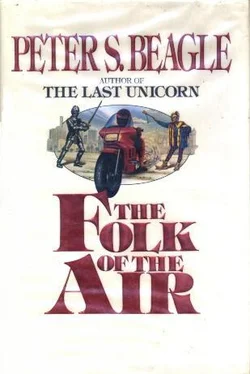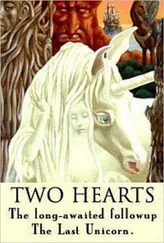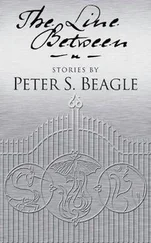And Matteo said, “People expect a lute, anything older than Mozart, they just do. We’re starting to play a lot of non-League jobs around town, and they always ask.”
“Paying gigs?”
Felix and Matteo nodded eagerly. Hamid chuckled, and Lovita squeezed Farrell’s arm, saying, “I’m his agent.”
Farrell said, “We’ll talk.”
The combat master lived in a fat, battered Victorian at the end of a torn-up street, isolated on three sides by construction moonscapes and on the fourth by a half-completed freeway tributary, so that the effect was of a ruinous old molar clinging on in a skeletal jaw. The front door was open, and Farrell’s companions led him into a high, cold room, empty of all furnishing or decoration, save for the rubbings and engravings of weapons and armor pinned to the walls. Five men, dressed alike in padded ski clothing, including boots and heavy gloves, were moving stiffly to stand before a goat-bearded little man in a blue polo shirt and faded chinos. When he turned to nod curtly to the newcomers, Farrell saw that his eyes were a bright yellow-gray, an African parrot’s eyes.
Two of the students wore conventional saber masks; two others had on motorcycle helmets with tinted bubble face guards. The face of the fifth man—a slighter figure than the rest, as far as Farrell could judge through the quilted jacket—was entirely hidden under a steel helmet like an upsidedown carafe, the lip of which extended down to cover the wearer’s neck. Where the handle should have been, the pointed visor jutted out, bucktoothed and blank. There were slits in the visor, but Farrell could see nothing through them.
Lovita nudged him, whispering, “Your Lady Murasaki, she made that one. Big old thing weighs more than she does.” The five men were now ranged before the combat master, peering warily at him over the painted shields on their arms. All but one of the shields were kite-shaped and wooden, four feet or more in length; the lone exception, shaped like a flatiron and obviously as faithfully ponderous as the steel helmet, belonged to the same slender man, whose limbs appeared almost too frail to support the rigors of authenticity. Farrell asked Hamid, “Did she make the shield too?”
The Saracen shook his head. “Henryk Tourneysmith made it last year for William the Dubious. William must have gotten tired of dragging it around.”
Matteo dei Servi had unwrapped his bundle of medieval paraphernalia and was changing clothes hurriedly as the little instructor moved nimbly among his padded pupils, sharply tapping a bent arm to bring a shield up to nose height, gripping and turning a shoulder until it made a right angle with the shield. “Bend your knees, I pray you, sweet lordlings. We have spoken of this before.” He had a dry, hot voice, rich with impatience. “Right hand on the hip to keep the shoulders straight.” He walked around the man with the steel helmet and shield and nudged him vigorously behind the knee. “Feet flat, knees right out over the toes. Ought to be like sitting in a rocking chair by now.” The man staggered and seemed for a moment about to crumple. The combat master said, “If you were properly balanced, I couldn’t do that,” and went on to correct the next student.
Hamid said softly to Farrell, “His name is John Erne. He’s been doing this for years, and it is the only connection he has with the League. Doesn’t dance, doesn’t feast, doesn’t take part in anything but this. He won’t even fight in the tournaments anymore.”
“What does he do the rest of the time?”
Hamid shrugged. “No idea. Man could be a dealer, man could be running a day-care center. I think he’s a closet investment counselor, but I can’t prove it.”
The combat master now chose a sword from several leaning in a corner—all made of planed and shaped rattan—and stood gazing abstractedly at the six men, letting the wooden blade rest on the palm of his left hand. Abruptly he swung the sword up and far back behind his shoulders, took two odd, spraddling steps forward, and struck with all his strength at the nearest man’s head. Farrell caught his breath; but the student’s shield came up to take the blow, which rattled the shield back into his face. The combat master immediately cocked his arm again for a savage cut at the student’s legs; when the swiftly lowered shield turned the blade once more, he aimed another stroke at the helmet and followed it with one to the exposed side. The student intercepted the latter attack, but moved his shield out of the perpendicular to do so, and the master promptly whipped his sword through a backhanded slash to catch the opposite leg just above the knee. The leg buckled, and the student gasped, dropping his guard to clutch himself.
“Up and down,” the little master said coldly. “The shield moves only up and down, my gentlemen.” Without another word, he leaped at the next man in line—Matteo dei Servi—battering the edges of his shield with a wild drumfire of circling overhand blows. The shield jumped and twisted, dragging at Matteo’s arm as he struggled to deflect the onslaught, but he managed to keep it from being driven to either side, and the rattan sword never touched his body. The master stalked on, a goateed golem in a polo shirt, smashing at the shields with a mechanical fury as they presented themselves—skinny arms swarming tirelessly, bunchy body almost coming off the floor with each blow. The cold room clacked like a windmill.
When he came to the slender man in the huge carafe-helmet, the combat master paused for a moment, his lined, slanting face seeming to hold pity uncomfortably. He struck twice, lightly, pushing the steel shield from side to side, then said something that Farrell could not hear. The student shook his head without answering and raised the shield to a defensive position again. The master sighed, and the rattan sword tinkled and tolled crazily on the painted steel. It was impossible for the slender man to move the shield quickly; he managed to block a surprising number of the strokes, but the rest went home on his body and legs, making a sound like pine sap exploding in a fire. He never flinched, but Farrell did.
The combat master stepped back and lowered his sword. “Ten minutes.” He turned abruptly toward Farrell, Hamid, Lovita, and Felix Arabia, walking with the powerful nearwaddle of a ballet dancer. When he hunkered down by them, leaning on the sword for support—a Roman campaigner squinting over the tumbled twilight ravines of Pictish country—he might have been thirty-five years old or sixty. His skin and his sweat-stiffened collar-length hair were the same anonymous color, somewhere between smoke and sand. Hamid said, “John Erne, the Knight of Ghosts and Shadows.”
John Erne extended his hand, smiling quickly. “Another musician? Yes, of course.” His round, shallow eyes went over Farrell’s body as if it were a car on the grease rack.
Farrell asked, “How do you know? Just because I came in with musicians?”
“Well, that,” John Erne said. “But mostly because you flinched so, every time I came near hitting somebody’s hand.” He held his own hands out in front of him, palms down, amusedly regarding their pale-furred backs. The knuckles lumped up like Turk’s-head knots, even with the hands open, and two nails on the right hand were black and crisp. “I average about a finger a year so far,” he said thoughtfully. “Broke a whole hand the spring before last, in a mêlée.” His hands were smaller than Farrell’s.
The combat students had taken off their helmets and were leaning against the wall, standing and sitting, all breathing with their mouths open. They all appeared to be in their late teens, except for Matteo dei Servi and the slender man, who sat by himself, bowed over the steel helmet in his lap. When he looked up, Farrell saw that he was Japanese.
Читать дальше












